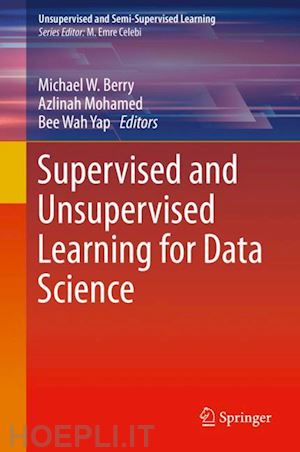
Questo prodotto usufruisce delle SPEDIZIONI GRATIS
selezionando l'opzione Corriere Veloce in fase di ordine.
Pagabile anche con Carta della cultura giovani e del merito, 18App Bonus Cultura e Carta del Docente
This book covers the state of the art in learning algorithms with an inclusion of semi-supervised methods to provide a broad scope of clustering and classification solutions for big data applications. Case studies and best practices are included along with theoretical models of learning for a comprehensive reference to the field. The book is organized into eight chapters that cover the following topics: discretization, feature extraction and selection, classification, clustering, topic modeling, graph analysis and applications. Practitioners and graduate students can use the volume as an important reference for their current and future research and faculty will find the volume useful for assignments in presenting current approaches to unsupervised and semi-supervised learning in graduate-level seminar courses. The book is based on selected, expanded papers from the Fourth International Conference on Soft Computing in Data Science (2018).
Professor Michael W. Berry is a Full Professor in the Departments of Electrical Engineering and Computer Science (EECS) and Mathematics at the University of Tennessee, Knoxville. He served as Interim Department Head of Computer Science from January 2004 to June 2007, and as Associate Head in the Department of Electrical Engineering and Computer Science from July 2007 to July 2012. He worked in the Communications Product Division of IBM in Raleigh, NC for about 1 year before accepting a research staff position in the Center for Supercomputing Research and Development at the University of Illinois at Urbana-Champaign. In 1990, he received a PhD in Computer Science from the University of Illinois at Urbana-Champaign. Prof. Berry is the co-author of "Templates for the Solution of Linear Systems: Building Blocks for Iterative Methods" (SIAM, 1994) and "Understanding Search Engines: Mathematical Modeling and Text Retrieval, Second Edition" (Bestseller, SIAM, 2005) and editor of "Computational Information Retrieval" (SIAM, 2001), "Survey of Text Mining: Clustering, Classification, and Retrieval" (Springer-Verlag, 2003, 2007), "Lecture Notes in Data Mining" (Bestseller, World Scientific, 2006), "Text Mining: Applications and Theory" (Wiley, 2010), and "High-Performance Scientific Computing" (Springer, 2012). He has published well over 150 peer-refereed journal and conference publications and book chapters. He has organized numerous workshops on Text Mining and was Conference Co-Chair of the 2003 SIAM Third International Conference on Data Mining (May 1-3) in San Francisco, CA. He was Program Co-Chair of the 2004 SIAM Fourth International Conference on Data Mining (April 22-24) in Orlando, FL., and he was a keynote speaker at the 2015 International Conference on Soft Computing in Data Science (SCDS2015). He was also honorary chair of the 2016 International Conference on Soft Computing in Data Science (SCDS2016) in Kuala Lumpur, Malaysia. His research interests include information retrieval, data and text mining, computational science, bioinformatics, and parallel computing. Prof. Berry's research has been supported by grants and contracts from organizations such as the National Science Foundation, National Institutes of Health, the U.S. Department of Energy, the the National Aeronautics and Space Administration, and the Intel Corporation.
Professor Dr Azlinah Mohamed is a Professor at the Faculty of Computer and Mathematical Sciences, Universiti Teknologi MARA, Malaysia. She currently serves as the Dean of the faculty; she was previously the Special Officer to the Vice Chancellor and Head of the Academic Affairs and Development Unit of Universiti Teknologi MARA. She received her MSc (Artificial Intelligence) from University of Bristol, UK and PhD (Decision Support Systems) from Universiti Kebangsaan Malaysia. Her recent research activities and numerous professional publications in international conferences and local journals focus on her interests in the Artificial Intelligence, Decision Support Systems and Soft Computing. She has published well over 180 peer-refereed journal and conference publications and book chapters. She was the Honorary Chair of the 2015, 2016 and 2017 International Conference on Soft Computing in Data Science, and she was a keynote speaker at the 2016 International Conference on Soft Computing in Data Science (SCDS2016). She was also awarded with many competitive grants from ScienceFund, MOSTI and others on both academic and industrial projects for the industry, as well as for the government. Her research works includes the Information Professionals’ Competency Assessment Model and the Multi-Parametric Pectin Lyase-Like Protein Function Classifier which had won many awards. She is also an active member of the Malaysia Information Technology Society (MITS), Lembaga Akredetasi Negara, Malaysia and Artificial Intelligence Society.
Professor Bee Wah Yap is a Professor at the Faculty of Computer and Mathematical Sciences, Universiti Teknologi MARA, Malaysia. She is the Head of Advanced Analytics Engineering Centre (AAEC), a Centre of Excellence in FSKM. She received her Bachelor of Science (Education)(Hons) degree, majoring in Mathematics from University of Science Malaysia, Master of Statistics from University of California Riverside and PhD (Statistics) from University of Malaya. Her research interests are in data mining, computational statistics and multivariate data analysis. She actively organizes SCDS2015, SCDS2016 and SCDS2017 conference which focus on Soft Computing in Data Science. She also actively conduct statistical workshops (IBM SPSS STATISTICS, IBM SPSS AMOS, PLS-SEM, SAS EMINER). She has published papers in ISI journals such as Expert Systems with Applications, Journal of Statistical Computation and Simulation, Communication in Statistics-Simulation and Computation, and also in Scopus indexed journals.











Il sito utilizza cookie ed altri strumenti di tracciamento che raccolgono informazioni dal dispositivo dell’utente. Oltre ai cookie tecnici ed analitici aggregati, strettamente necessari per il funzionamento di questo sito web, previo consenso dell’utente possono essere installati cookie di profilazione e marketing e cookie dei social media. Cliccando su “Accetto tutti i cookie” saranno attivate tutte le categorie di cookie. Per accettare solo deterninate categorie di cookie, cliccare invece su “Impostazioni cookie”. Chiudendo il banner o continuando a navigare saranno installati solo cookie tecnici. Per maggiori dettagli, consultare la Cookie Policy.